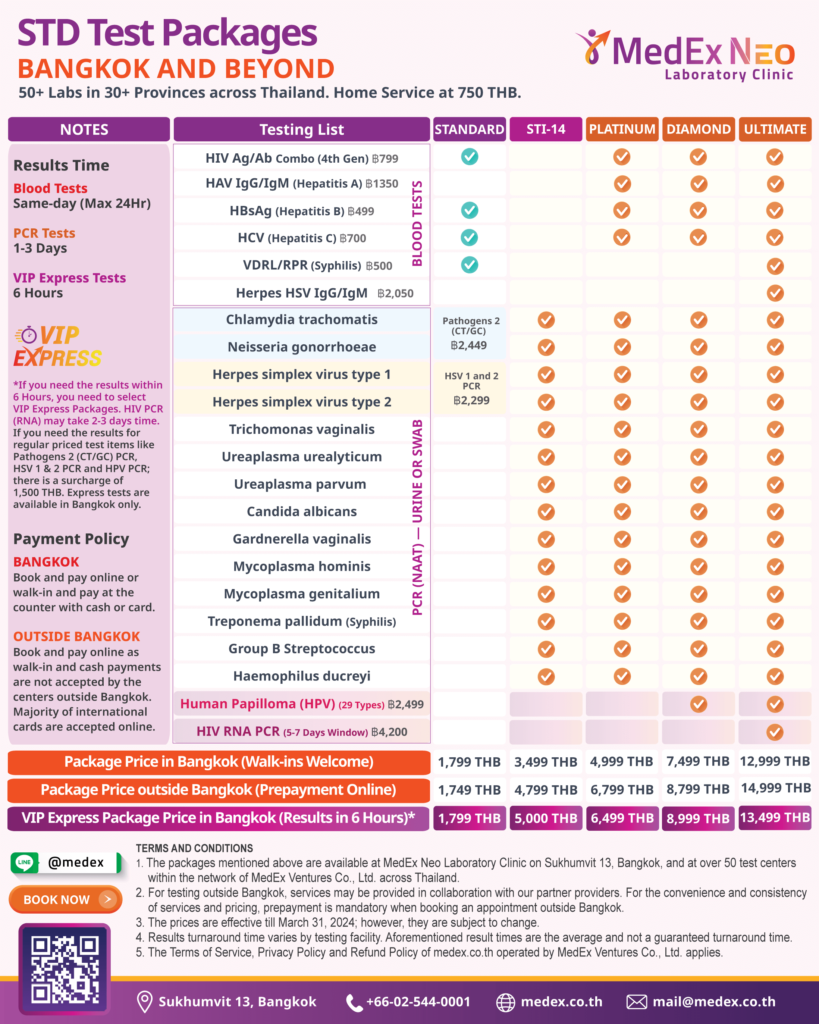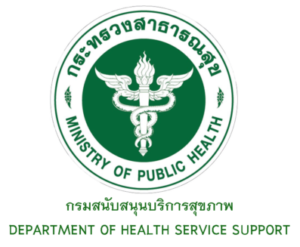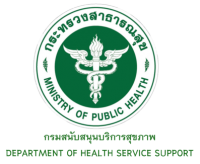How much does STD testing cost in Bangkok, Thailand?
STD testing in Bangkok varies based on the type of test. Prices start from 1,799 THB for the Standard Package, which includes HIV, Hepatitis B, Hepatitis C, and Syphilis testing. For more comprehensive testing, such as the STI-14 Package, the price is 3,499 THB. Testing services are available at clinics and at home across 30+ provinces, including Pattaya, Phuket, Chiang Mai, and more.
Where can I get an STD test in Bangkok?
STD tests are available at several clinics, hospitals, and health centers in Bangkok, with flexible options for walk-in appointments and online bookings. Beyond Bangkok, STD testing services are available in over 30 provinces across Thailand. You can also choose home testing, where a clinician visits your home or hotel to collect samples within 1-2 hours of booking.
What is the fastest STD test result time in Bangkok?
The fastest STD test results in Bangkok are available through express testing services, which can deliver results within 6 hours, particularly for PCR-based tests such as STI-14. This service is available in Bangkok and major provinces like Phuket, Pattaya, and Chiang Mai.
Can I get STD testing at home in Thailand?
Yes, STD testing is available at home or in hotels across Thailand, including Bangkok and 30+ provinces such as Phuket, Pattaya, Chiang Mai, and Koh Samui. After booking, a clinician will visit your location within 1-2 hours to collect the necessary samples. This service provides a private and convenient testing option.
What is included in the Ultimate STD Test Package?
The Ultimate STD Test Package includes the most comprehensive sexual health screening available. It covers HIV RNA PCR (detectable 5-7 days after exposure), HPV PCR (29 genotypes), herpes simplex virus (IgG/IgM), syphilis, chlamydia, gonorrhea, and more. This package is available both at clinics and as part of the home-testing service across Thailand.
Are STD tests anonymous and confidential?
Yes, STD tests are completely anonymous and confidential. No identification, such as a passport, is required. All results are sent securely via email, ensuring your privacy. Testing services, including at-home testing, maintain strict confidentiality protocols.
How long do STD test results take?
STD test results typically take between 1 to 24 hours, depending on the package you select. For those opting for express services, results can be delivered in as little as 6 hours, especially for tests like the STI-14 PCR, which is available at clinics and through home testing services.
Can I get a same-day STD test in Thailand?
Yes, same-day STD testing is available in Bangkok and 30+ provinces. You can book online, visit a clinic, or opt for home testing services. Same-day test results are available through VIP express packages, ensuring you get the results quickly, no matter your location in Thailand.
What STD test packages are available in Bangkok?
In Bangkok, a variety of STD test packages are available, starting with the Standard Package at 1,799 THB, which includes HIV, Hepatitis B, Hepatitis C, and Syphilis screening. The STI-14 Package, priced at 3,499 THB, tests for 14 different infections, including chlamydia, gonorrhea, and herpes. Testing services are also available in more than 30 provinces, with express results and at-home testing options.
Where can I get express STD testing in Bangkok?
Express STD testing is available at clinics in Bangkok and over 30 provinces across Thailand, with results provided in as little as 6 hours for PCR-based tests like the STI-14 PCR. Clinics and home-testing services offer easy access to quick and reliable results.
How accurate are STD tests in Thailand?
STD tests in Thailand are highly accurate due to the use of advanced diagnostic methods such as PCR (Polymerase Chain Reaction) and NAAT (Nucleic Acid Amplification Test). These methods detect infections early with precision. Testing services are supported by JCI (US)-accredited top private hospitals to ensure reliable results and effective treatment.
What is the most common STD in Bangkok?
In Bangkok, common STDs include chlamydia, gonorrhea, and syphilis. Regular testing is important, as many STDs are asymptomatic. Comprehensive STD screening packages are available in Bangkok and other provinces, allowing you to detect these infections early and receive timely treatment.
How long do I need to wait before getting tested after unprotected sex?
It is generally recommended to wait 1 to 3 weeks after unprotected sex to get tested for most STDs. However, some tests, like the HIV RNA PCR, can detect infections as early as 5-7 days post-exposure. You can get tested at a clinic or opt for home testing services in 30+ provinces across Thailand.
Can I get same-day STD test results in Thailand?
Yes, same-day STD test results are available through express services, with results delivered within 6 hours for certain tests like the STI-14 PCR. This service is available at clinics in Bangkok and other provinces, and also through home testing services.
What are the symptoms of gonorrhea in women?
Symptoms of gonorrhea in women include painful urination, increased vaginal discharge, and bleeding between periods. However, many women may not experience any symptoms, which is why regular testing is important. Testing is available at clinics and through home testing services across Thailand.
Where can I get a rapid HIV test in Bangkok?
Rapid HIV tests are available at clinics in Bangkok and in other major provinces. With express testing options, you can get results in as little as 6 hours. These tests are also available through home testing services, providing flexible options for those needing immediate results.
Is home STD testing available in Thailand?
Yes, home STD testing is available across Thailand, including Bangkok, Pattaya, Phuket, Chiang Mai, and more. A clinician can visit your location within 1-2 hours to collect samples. This service is discreet, and results are emailed securely within 1-24 hours.
How often should I get tested for STDs if I live in Thailand?
It is recommended to get tested for STDs at least once a year if you are sexually active. Those with multiple partners or a history of STDs should consider getting tested more frequently. Testing and treatment are available at clinics and through home testing services in 30+ provinces across Thailand.
What are the early signs of syphilis?
Early signs of syphilis include painless sores on the genitals, mouth, or rectum. If left untreated, syphilis can progress to cause rashes and other severe symptoms. Regular testing, available at clinics and through home services, is important for early detection and treatment.
How do I book an STD test in Bangkok?
Booking an STD test in Bangkok is easy. You can book an appointment online, call the clinic's helpline, or visit one of the many clinics across 30+ provinces. Home testing services are also available, offering flexible booking options for those who prefer testing in the comfort of their own home.




























